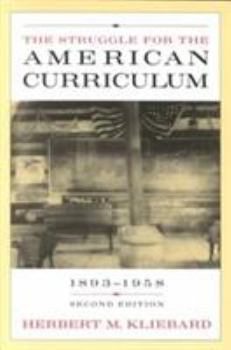The Struggle for the American Curriculum: 1893-1958
Select Format
Select Condition 
Book Overview
Published in 1987, the first edition of The Struggle for the American Curriculum was a classic in curriculum studies and in the history of education. This new third edition is thoroughly revised and... This description may be from another edition of this product.
Format:Paperback
Language:English
ISBN:0415910137
ISBN13:9780415910132
Release Date:November 1994
Publisher:Routledge
Length:320 Pages
Weight:1.12 lbs.
Dimensions:0.9" x 6.7" x 8.4"
Customer Reviews
3 ratings
Fascinating and comprehensive look at the history of modern American education during its most forma
Published by Thriftbooks.com User , 17 years ago
This is a fascinating and comprehensive look at the history of modern American education during its most formative time...roughly the first half of the 20th century. What is most striking to me is that the debates I see in schools and classrooms today were fought on a national scale during this time. This is an important book for anyone who wants background on the relationship among philosophy, values, methods, content, educational practices, and institutions. You can see the history of many of the fundamental elements of modern American concepts of schools (grades, subjects, testing). Looking at this history and seeing the causes, people, decisions, and debates--how our assumptions are a construct--can expand a reader's concept about what is currently possible. For example, viable models of education based on child development that are now echoed by contemporary calls for more learner-centered pedagogy were steamrolled with factory models based on calls for "efficiency." It's grist for expanding your thinking about what is possible today in education...at least is was for me. It's a good read as well...you'll be writing in the margins and underlining passages, even if you don't have a paper due.
Essential Reading
Published by Thriftbooks.com User , 18 years ago
Kliebard's "Struggle", now in its third edition, is considered by most to be one of THE most important books about the history of American education. Starting in the early 1890's with the Committee of Ten, Kliebard gives the reader a coherent version of a rather complex story, the story of how four factions have competed to build American schools in their own image. Interestingly, Kliebard shows how each faction was able to have profound influnece on public education and how we think about education in general. Those who believe that schools should be a place where young people are intellectually engaged in worthwhile learning for the ultimate purpose of developing active democratic citizens may walk away from the book a little depressed since Kliebard does seem to indicate that the factions who believe schools are meant to 1) prepare young people for jobs 2)secure American hegemony in the global marketplace, or 3)indoctrinate students to be obediant patriots who conform blindly to whatever adults tell them are the ones who in the end have had the most influence on what our children are actually doing (or not doing) in public schools. Kliebard's quote of Joel Spring in the Afterword rings true for democratic educators who have dedicated their lives to improving education for the common good. Spring contends that the "social efficiency" faction has left such a deep impression on American education that any efforts at reform are hopeless because there are certain organizational features of our schools which we take for granted as normative inhibit freedom and individuality and demand social adaptation. At any rate, this book is great for anyone who wants to learn more about the deep history of why our schools look the way they do and who is patient enough to read through an intelligent and scholarly work.
Good Book
Published by Thriftbooks.com User , 18 years ago
Keliebard's book introduces the readers to the long history of American education. Essentially, education was something the wealthy used to keep their places in life, but eventually as education became more widespread, it became problematic and the fight for the American Curriculum began to take shape. With its many twist and turns, the reader is given a glimpse into why education is the way it is, and the many voices and philosophies that helped shape it into its current hegemonic institution. The movement that has left the widest and most permanent imprint on education is that of social efficiency, rooted in the concepts of the Industrial Revolution - get them in and get them out. Sadly, that is the way things truly are. The battle goes on. Recommended for anyone questioning the underlying beliefs of our current educational system.





